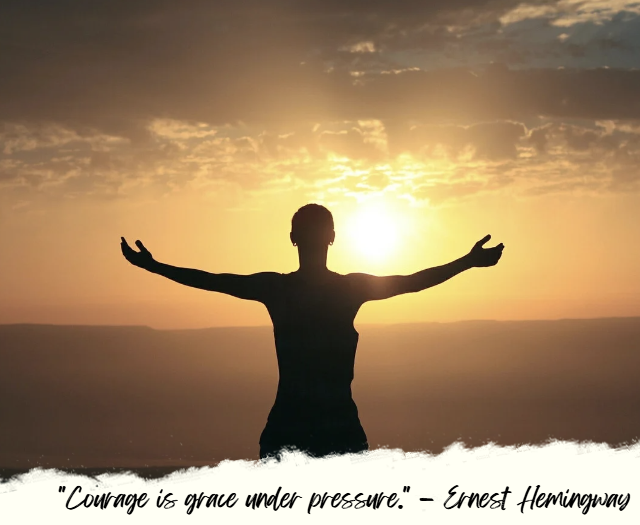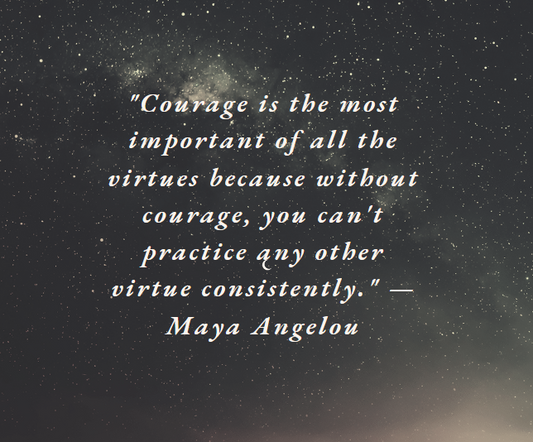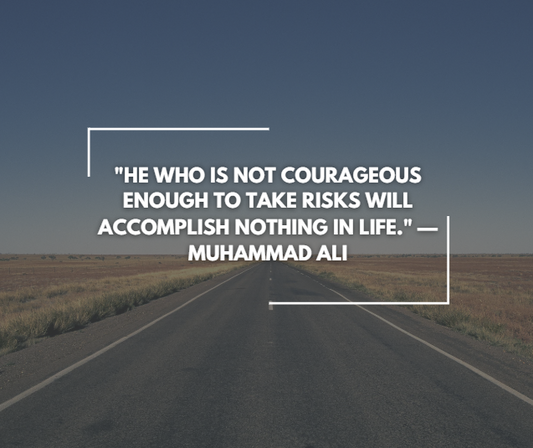Ernest Hemingway's assertion that “Courage is grace under pressure” elegantly captures the essence of true bravery. This quote reflects a profound understanding of courage as not merely the absence of fear or the lack of challenges but as the ability to maintain composure and dignity in the face of adversity. Hemingway’s words offer valuable insights into the nature of courage and how it manifests under the most demanding circumstances.
Understanding Courage Under Pressure
At its core, courage involves confronting fears and taking action despite them. However, Hemingway’s definition elevates courage to a higher plane, emphasizing not just the act of bravery but the manner in which one handles pressure. Grace under pressure implies a calm and controlled response to stress and danger, showcasing a blend of inner strength and composure.
In many situations, the true test of courage is not in the absence of fear but in the ability to act with dignity and integrity when the stakes are highest. Grace under pressure involves maintaining one’s values, making reasoned decisions, and demonstrating resilience even when faced with intense stress or threat.
The Role of Composure in Courage
Composure plays a critical role in demonstrating courage. When individuals maintain their calm and poise amidst turmoil, they not only handle the situation more effectively but also inspire confidence in others. This sense of grace under pressure is crucial for leaders, professionals, and individuals who face challenging circumstances.
For instance, during a crisis, a leader who remains calm and makes thoughtful decisions can significantly impact the outcome. Their ability to manage stress without succumbing to panic or impulsivity not only fosters trust but also helps guide others through the difficult period.
Historical and Modern Examples
Hemingway’s concept of courage as grace under pressure can be seen in various historical and modern contexts. One notable example is Winston Churchill’s leadership during World War II. Churchill’s speeches and actions during the war were characterized by his unwavering composure and resolute determination, even when the threat of invasion was imminent. His ability to inspire and maintain morale through such pressure exemplified grace under pressure.
In the realm of sports, athletes like Serena Williams and Michael Jordan have demonstrated grace under pressure by performing at their best during high-stakes moments. Their ability to focus, execute their skills, and remain poised during critical points in their careers showcases courage in action.
Personal Applications of Grace Under Pressure
Applying the concept of grace under pressure in personal life involves several key practices:
-
Emotional Regulation: Managing emotions effectively is crucial for maintaining composure. Techniques such as deep breathing, mindfulness, and positive self-talk can help individuals stay calm and focused.
-
Preparation and Planning: Being well-prepared for potential challenges can reduce stress and enhance one’s ability to handle pressure. Anticipating possible scenarios and developing strategies can increase confidence and resilience.
-
Maintaining Perspective: Keeping a broader perspective on the situation can help individuals stay grounded. Understanding that challenges are part of the journey and that they are temporary can provide reassurance and clarity.
-
Seeking Support: Having a support system in place can provide emotional and practical assistance during stressful times. Relying on trusted friends, family, or colleagues can offer valuable perspectives and encouragement.
-
Staying True to Values: Adhering to personal values and principles, even under pressure, can provide a sense of purpose and direction. It helps individuals make decisions that align with their beliefs and maintain their integrity.
The Impact of Grace Under Pressure
Demonstrating grace under pressure has a profound impact on both the individual and those around them. For the individual, it enhances self-confidence and resilience, making it easier to navigate future challenges. For others, it provides inspiration and a model for how to handle difficult situations with dignity and strength.
In professional environments, grace under pressure can foster a positive and supportive atmosphere. It encourages teamwork, trust, and effective problem-solving. In personal relationships, it can strengthen bonds and build mutual respect.
Conclusion
Ernest Hemingway’s insight that “Courage is grace under pressure” offers a nuanced understanding of bravery. True courage involves not only confronting fear but doing so with composure, dignity, and integrity. By maintaining grace under pressure, individuals demonstrate their inner strength and resilience, inspiring others and navigating challenges with effectiveness and poise. Whether in leadership, personal endeavors, or everyday situations, embracing grace under pressure can lead to greater success, fulfillment, and respect.





